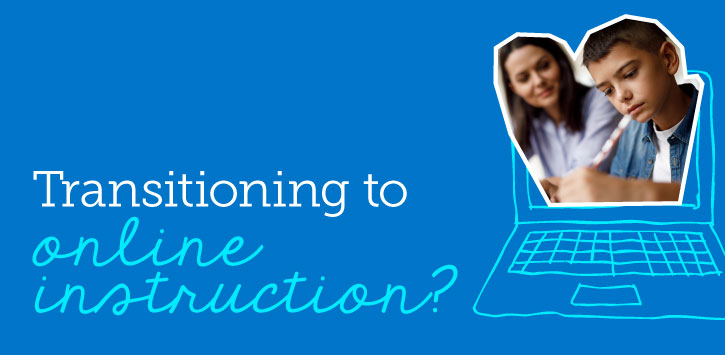True & Tested Tips for Teachers Going Virtual
By Rose Rodriguez, FLVS Full Time Music Instructor

With so much panic and chaos going around us due to COVID-19, it is easy to get anxious and overwhelmed. This can be especially true for teachers whose schools have to close for an extended period of time. You may have been asked to leave your routine and embrace a virtual environment overnight and that can be very stressful.
You've got this!
I was a brick-and-mortar teacher for more than 15 years and I transitioned into online teaching 10 years ago. At that time I considered myself a veteran teacher and let me tell you I still felt like a first-year teacher all over again. I had mentors, training, and most importantly, I had time to adapt to my new classroom environment. I understand how many teachers may be completely overwhelmed trying to figure out online teaching in just a matter of days.
I hope this article is helpful and practical to any teacher going through this situation as they navigate the next few weeks.
Here are some of my best tips for going virtual!
Create a roster with parent and student phone numbers
If you’re teaching middle and high school students and don't have one already, this will be essential for regular communication. You may want to call your families to check-in, see how they are doing, and let them know what your virtual classroom will look like. You may be surprised at how grateful parents and students will be just to have a calming voice letting them know what the expectations will be for the next few weeks. Keep this call short and positive and direct students to your digital bulletin board for details. This roster can also double as a communication log if you don't have one readily available from your school or district. You can easily create this document using Excel or Google Sheets.
Create a digital bulletin board or class site
If your school or district has not provided a platform for this, you can use a Google Site which is very easy to use and uses drag and drop templates. Google's clean design will look professional and will provide most of the features you will need. Start here if you are not familiar with Google sites and feel free to watch the many video tutorials on YouTube as well.
Go back to basics
You may be wondering how families will be able to handle the demands of completing work online if they are not prepared. However, keep in mind that most families, with few exceptions, have at least one computer, some form of internet connectivity, or at the very least a phone. A phone call will always be your first choice for communicating with students, especially those that are not replying to your emails or submitting work.
Make technology work for you!
If you are ready to dive into more technology-savvy methods of communicating, get your phone or webcam ready. You can use apps like Skype or Google Meet to have face-to-face video calls with students and parents. In my experience, high school students love to text so if this is your demographic get your texting game into gear by signing up for a Google Voice number. You can text and take calls directly from your computer, making typing and dialing much easier.
Go fully virtual without losing the personal touch!
If you want to host live virtual sessions with students, you can start with a platform like Google Meet. This platform can host up to 100 participants and has both audio and video capabilities.
You can also check out Zoom which is the platform we use at Florida Virtual School. They have a dedicated site for schools and districts affected by COVID-19 to help you get started.
Continue working with your team
Probably the most important reason I am recommending Google products is that they are so easy to share that remote collaboration is a cinch! Your team can create a folder in Google Drive where all your documents can be stored and shared.
Help your students submit work virtually
And finally, the $100,000 question…how can students submit work virtually? In my experience, there is nothing easier to use than Google Forms unless your school or district has already provided you with an LMS (Learning Management System) platform. You can customize forms to do pretty much anything you could with a paper and pencil assessment. Also, tracking student submissions is easy. You can view their responses as a group, individually, or even export as an Excel sheet. You can also control how long the form is open so once the assessment is due you can turn it off. And if you use the Excel export feature, you can create an Excel book that doubles as a virtual grade book if needed.
I hope these tips can help you at least get started. And just think, now you will not only be ready to quickly transition to virtual teaching in case of any future emergencies, but you will also have a whole new toolbox that you can continue using in your classroom once you return to your normal setup.
Still have questions?
Don’t hesitate to reach out to our community of virtual teachers for help. Join our LinkedIn group to ask questions about best practices in online learning. We are happy to help!

 Whoops, that's an error!
Whoops, that's an error!